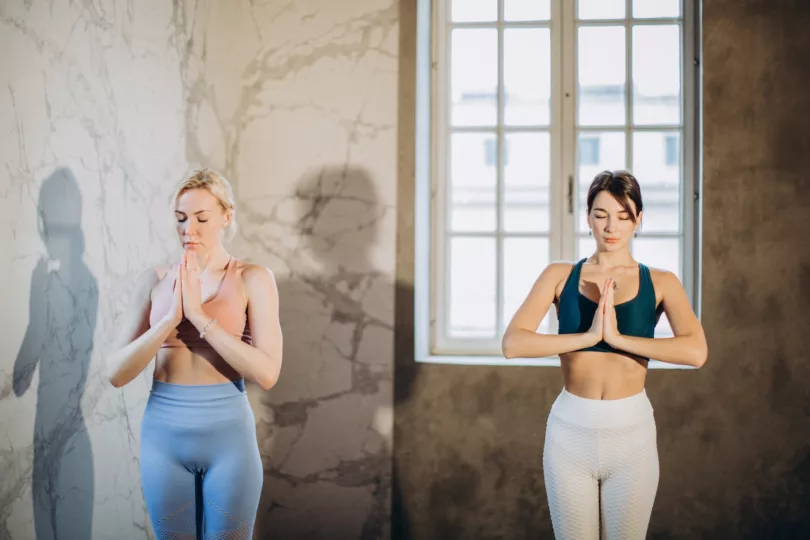Yoga has become increasingly popular in recent years, and for good reason. While many people associate yoga with physical fitness and flexibility, it also has numerous mental health benefits. In this article, we’ll explore the mental benefits of yoga, with a particular focus on stress relief.
Introduction
We live in a fast-paced world that can be incredibly stressful. From work to family obligations to financial pressures, there are many sources of stress in our lives. Chronic stress can have a negative impact on our mental and physical health, leading to anxiety, depression, and other health problems. Yoga is a powerful tool that can help us manage stress and improve our overall well-being.
What is Yoga?
Yoga is an ancient practice that originated in India thousands of years ago. It combines physical postures, breathing techniques, and meditation to promote health and well-being. While there are many different styles of yoga, they all share a common goal: to help practitioners achieve balance and harmony in their bodies and minds.
Yoga and Stress Relief
Stress is a natural part of life, but too much stress can be harmful to our health. Chronic stress can lead to a variety of health problems, including high blood pressure, heart disease, and mental health disorders. Yoga has been shown to be an effective tool for managing stress and reducing its negative effects on the body and mind.
How Yoga Reduces Stress
There are several ways that yoga can help reduce stress. First, the physical postures help to release tension in the body, which can help to reduce feelings of anxiety and stress. Second, the breathing techniques used in yoga help to calm the mind and promote relaxation. Finally, the meditation component of yoga can help to quiet the mind and reduce feelings of stress and overwhelm.
Other Mental Benefits of Yoga
In addition to stress relief, yoga has numerous other mental health benefits. Here are some of the most notable:
Yoga and Depression
Yoga has been shown to be an effective complementary treatment for depression. It can help to reduce symptoms of depression, such as sadness, anxiety, and fatigue. Yoga may also help to improve mood and increase feelings of well-being.
Yoga and Anxiety
Yoga has been shown to be an effective tool for managing anxiety. It can help to reduce symptoms of anxiety, such as racing thoughts, tension, and restlessness. Yoga may also help to improve overall mood and reduce feelings of stress and overwhelm.
Yoga and PTSD
Yoga has been shown to be an effective complementary treatment for post-traumatic stress disorder (PTSD). It can help to reduce symptoms of PTSD, such as hyperarousal, avoidance, and re-experiencing. Yoga may also help to improve overall mood and increase feelings of well-being.
Yoga and Addiction
Yoga has been shown to be an effective complementary treatment for addiction. It can help to reduce cravings and improve overall mood. Yoga may also help to increase feelings of self-awareness and self-control, which can be beneficial for individuals in recovery.
Yoga and Self-Awareness
Yoga can help to increase self-awareness, which is the ability to recognize and understand our own thoughts, feelings, and behaviors. By increasing self-awareness, yoga can help us make better choices and improve our overall well-being.
Yoga and Emotional Regulation
Yoga can help to regulate emotions and improve emotional resilience. By practicing mindfulness and staying present at the moment, yoga practitioners can learn to better manage their emotions and respond to stressors in a healthy and effective way.
Yoga and Cognitive Function
Yoga has been shown to have a positive impact on cognitive function, including memory, attention, and processing speed. Regular yoga practice may also help to prevent age-related cognitive decline and improve overall brain function.
Yoga and Sleep
Yoga can be beneficial for individuals who have difficulty sleeping. Certain poses and breathing techniques can help to promote relaxation and improve sleep quality. Regular yoga practice may also help to reduce symptoms of sleep disorders such as insomnia.
How to Get Started with Yoga
If you’re interested in trying yoga, there are several ways to get started. You can find local yoga studios or classes at your gym, community center, or online. There are also many free resources available online, such as instructional videos and guided meditations.
It’s important to remember that yoga is a personal practice, and what works for one person may not work for another. It’s important to find a style and teacher that resonates with you and to listen to your body and practice at your own pace.
Conclusion
Yoga is a powerful tool that can help to reduce stress, improve mental health, and promote overall well-being. By incorporating yoga into your daily routine, you can experience the many benefits it has to offer.
Related Article: Yoga for Hips: Poses and Benefits
Related Article: Yoga for Legs: Improve Strength, Flexibility, and Circulation
FAQs
Is yoga safe for people with mental health disorders?
While yoga can be beneficial for individuals with mental health disorders, it’s important to consult with a healthcare professional before starting a yoga practice.
Can yoga cure mental health disorders?
While yoga can be an effective complementary treatment for mental health disorders, it’s important to seek professional medical help if you are experiencing symptoms of a mental health disorder.
How often should I practice yoga?
The frequency of your yoga practice will depend on your individual needs and schedule. It’s recommended to practice yoga at least 2-3 times per week for optimal benefits.
Do I need to be flexible to practice yoga?
No, flexibility is not a requirement for practicing yoga. Many yoga poses can be modified to accommodate different levels of flexibility and mobility.
Can yoga be practiced at home?
Yes, yoga can be practiced at home using instructional videos or by following along with online classes. However, it’s important to ensure that you are practicing safely and effectively.







